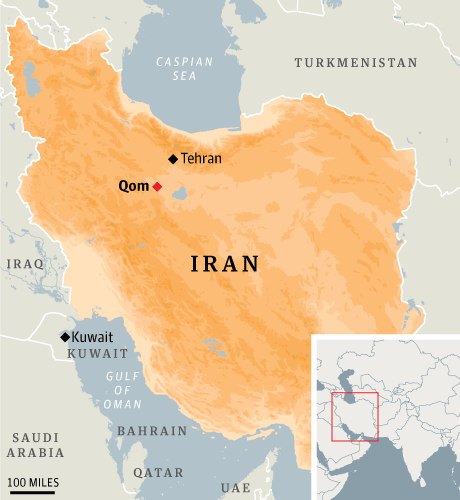Obama condemns Iran over secret nuclear plant
Iran's president, Mahmoud Ahmadinejad, warns the US president his ultimatum on nuclear programme is a mistake
The US, Britain and France issued a strongly worded ultimatum to Iran today after US officials disclosed the existence of a secret nuclear plant which the Iranian authorities have kept hidden from UN inspectors for years.
Days ahead of a showdown meeting with Iran in Geneva, Barack Obama demanded that the UN nuclear watchdog, the International Atomic Energy Agency (IAEA) be allowed access to the plant, which is built inside a mountain near the ancient city of Qom, one of the holiest Shia cities.
Obama described the site, apparently a second Iranian facility for enriching uranium, as a "disturbing revelation". Iran denied it was clandestine and said it had informed the IAEA about the plant earlier this week.
Iran's president, Mahmoud Ahmadinejad, fired a warning back at Obama saying: "If I were [President] Obama's adviser, I would definitely advise him to refrain from making this statement because it is definitely a mistake."
He told Time magazine that Obama's ultimatum "simply adds to the list of issues to which the United States owes the Iranian nation an apology over."
Western leaders, increasingly exasperated at Iran's nuclear truculence, were little assuaged by Iran's belated admission of the site's existence, which appears to have come after Iran learned that western intelligence services were on to its secret establishment.
Obama said: "This site deepens a growing concern that Iran is refusing to live up to those international responsibilities, including specifically revealing all nuclear-related activities. As the international community knows, this is not the first time that Iran has concealed information about its nuclear programme."
He added that the size and configuration of this facility was inconsistent with a peaceful nuclear programme. "Iran is breaking rules that all nations must follow," he said.
Both Gordon Brown and the French president, Nicolas Sarkozy, signalled a move towards new United Nations sanctions being imposed against Iran, a move that will heighten tensions in the already volatile region.
"We cannot let the Iranian leaders gain time while the motors are running," Sarkozy said. "If by December there is not an in-depth change by the Iranian leaders, sanctions will have to be taken."
"I am expecting from the IAEA an exhaustive, strict, and rigorous investigation."
Brown said Iran was guilty of "serial deception" and it was time for the international community to draw a line in the sand.
"On 1 October, Iran must now engage with the international community and join the international community as a partner," Brown said. "If it does not do so, it will be further isolated."
Russia's president, Dmitry Medvedev, was reportedly concerned at the development, saying the revelation of a new Iranian nuclear site was disturbing.
Iran denies it is pursuing a nuclear weapon and insists its programme is solely for the generation of electricity. But western experts question why a legitimate operation would need to be concealed in a facility in a clandestine, underground site.
Iran also argues that the reported scale of the facility is too small to be suitable for a civil nuclear programme.
If Iran does not comply with its demands, the US will lead a push to impose new United Nations sanctions. Russia, which has a veto on the UN security council, has previously opposed sanctions but appears to be shifting. China is still opposed but could abstain rather than exercise its veto.
There are sanctions in place against Iran at present but they have been largely ineffective. David Albright, a former UN weapons inspector in Iraq and head of the Washington-based Institute for Science and International Security, said that the west could simply stop buying Iranian oil. "It has consequences for us but it would be devastating for Iran," he said.
If sanctions fail, Israel has hinted it is prepared to order air strikes against Iranian nuclear facilities.
 Map showing location of Qom, near to the secret nuclear base
Map showing location of Qom, near to the secret nuclear base Iran sent details of its latest nuclear facility to the IAEA on Monday, saying it had established a second "pilot" enrichment plant, parallel to the one monitored by the IAEA near the city of Natanz.
But US and French intelligence services have been aware of the plant for some time, and western officials said that the Iranian letter was only sent after Iran discovered that its adversaries already knew of the plant.
IAEA officials reported that the Iranian letter claimed the site was under construction and that no nuclear material had yet been put into its centrifuges – the machines that can be used to enrich uranium for nuclear power or bombs.
An IAEA spokesman, Marc Vidricaire, confirmed the receipt of the letter and said the agency had been informed "that a new pilot fuel enrichment plant is under construction". The letter said the plant would not enrich uranium beyond the 5% level suitable for civilian energy production. That would be substantially below the threshold of 90% or more needed for a weapon. The plant is understood to be equipped with around 3,000 centrifuges.
Iran told the agency "that no nuclear material has been introduced into the facility", Vidricaire said. "In response, the IAEA has requested Iran to provide specific information and access to the facility as soon as possible."
According to Reuters, an Iranian news agency quoting an "informed source" said the second plant was similar to Iran's first facility near Natanz.
"Reports by some foreign news agencies that Iran has launched its second enrichment centre are correct and Iran has informed the [UN nuclear watchdog] about this," the ISNA news agency quoted its source as saying. "The second enrichment centre is similar to the enrichment installations at Natanz."
0 Comments:
Post a Comment